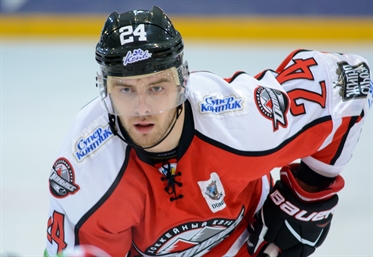Donbass back on Euro stage
Donbass back on Euro stage
Ukraine’s top team returns to Continental Cup action

 Roman Blagy returned to Ukraine to play for his former club team HC Donbass, which now calls the rink at Druzhkivka home. Photo: Vadim Shamdan
Roman Blagy returned to Ukraine to play for his former club team HC Donbass, which now calls the rink at Druzhkivka home. Photo: Vadim Shamdan
For Ukrainian national team forward Roman Blagy, though, who played in the 2014 final in Rouen, France, this weekend’s trip to Odense, Denmark, is the start of a revenge mission.
“I don’t have happy memories of the 2014 finals because we didn’t win the tournament,” he told IIHF.com. “We had a really strong team that was good enough to beat all our rivals, but in the end we lost to Rouen, a team that was beaten heavily in its previous games. We went out and lost that game and it pushed us into second place. It was a big disappointment because we believed that a second Continental Cup win for Donbass was in our hands.”
That time, a shock shoot-out loss against Rouen Dragons saw Donbass lose out to the Stavanger Oilers, even though Blagy and his team-mates had beaten the Norwegians earlier in the competition. Now, despite starting in the second qualifying phase with a four-team group stage against host Odense Bulldogs, Britain’s Nottingham Panthers and the Angers Ducs of France, Blagy is aiming high for the 2016/17 edition.
“Today I’d like to finish the job. To go further in the competition and win it all,” he added. “We’re expecting a real battle in Odense. There’s not much between these teams and every game will be fought out blow for blow. There won’t be any easy games here. We’ve not had a chance to see much of our opponents yet, but our coaches are on the case and they’ve promised to get us up to speed before we get to the tournament.”
The top two teams from the round-robin group will progress to the tournament’s final four, with the leaders from Group E, playing in Ritten, Italy, making up the finalists. It’s a journey that Donbass has done before, reaching the final four in 2012 before winning on home ice in 2013.
In 2013 and 2014, Donbass was playing in the KHL under head coaches Julius Supler and then Andrei Nazarov. Fans in Donetsk were looking forward to a new ice arena and hoping to see their team emulate the city’s football club, Shakhtar, and become a significant part of the European sporting scene.
Everything changed in the spring of 2014, though. A political crisis exploded into violence. Donbass produced its best ever KHL playoff campaign, despite safety concerns forcing the team to move some of its post season home games to Bratislava and Prague. After that, though, it withdrew from the KHL for the 2014/15 season in the expectation of being able to return after a one-season time-out. The Druzhba Arena was damaged during the fighting as was the football stadium and their airport and plans to open a new 12,800-seater arena in the city stalled as the conflict continued.
Donbass returned to the ice for the 2015/16 Ukrainian championship, playing in Druzhkivka. While Donetsk is in the separatist-held area of the self-proclaimed Donetsk People’s Republic, Druzhkivka is 90 km northwest from Donetsk in the area under control of the Ukrainian government.
Against such a challenging background, a return to the international hockey stage offers a valuable chance for Donbass and the Ukrainian League to remind Europe what it can offer.
“It’s important to be involved in the Continental Cup because Ukrainian hockey is not as competitive as we would like,” Blagy added. “Any performance on the international stage is a chance to test ourselves, to demonstrate our level. We can prove our worth to ourselves and to a wider audience.”
But the level at Donbass is not the same as during the KHL years. The roster that Blagy played with in France featured the likes of Yevgeni Dadonov, now a star for SKA St. Petersburg and the Russian national team, Slovak goalie Jan Laco, who went on to play for his country at the Sochi Olympics, and the extensive NHL experience of Randy Robitaille and former Ukrainian NHL player Ruslan Fedotenko. Many other players from that team are still active in the KHL, where Blagy himself started the season at Metallurg Novokuznetsk.
Today’s roster, though, relies far more on local talent. It’s a younger team, and Blagy himself admits that there is a colossal difference between the Ukrainian League and the KHL.
“It’s almost impossible to compare the two,” he said. “In the KHL the games are much faster, more unforgiving. If you make a mistake in your zone, there’s a 75% chance it will end up in your net. In the Ukrainian League, opponents give you more second chances. The two are on completely different levels of hockey.”
Ukrainian hockey is a long way from its post-Soviet high point in the early 21st century, when the national team reached the 2002 Olympics and was a fixture in the top tier of the World Championship from 1999-2007. But interest in the game remains strong, giving Blagy hope that there could be a bright future.
“We know there’s interest in Ukrainian hockey – we can see that when we look at the crowds for our games,” he said. “But we need more teams, and better quality arenas. Not all of the buildings we use at the moment are all that spectator-friendly. If we can make it even more attractive to the fans, they will turn our games into a celebration. That’s a win-win for everybody.”
Back to Overview















































